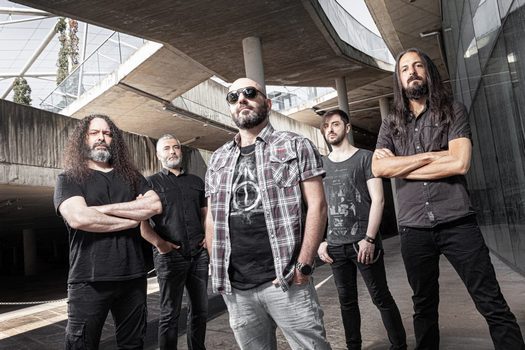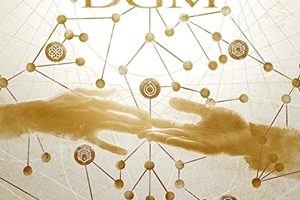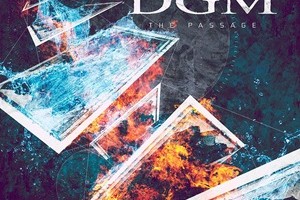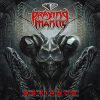DGM – All About the Songs
Friday, 6th November 2020
One of the premiere longstanding progressive metal acts from Italy, DGM continue to strive for a balance between virtuoso musicianship and memorable songwriting. Tragic Separation as the band’s latest studio album contains all the hallmarks of a veteran quintet confident to deliver stunning instrumental combinations as well as solid vocal melodies, hooks, and songs that connect with the listeners on multiple levels. We reached out to guitarist/main songwriter Simone Mularoni on Skype and he was happy to give us more insight into the process and outlook of the new record. We also discuss his role as a producer in his own Domination Studio, the impressive video work for “Flesh and Blood”, career highlights from the USA to Japan and China, and what’s on the horizon for the next year or so.
Dead Rhetoric: Tragic Separation is the latest studio album for DGM – one that you spent over a year just in the writing process to create beyond the demo to recording stages. Where did you want to take this album that may be different, special, or unique compared to the previous discography for DGM?
Simone Mularoni: That’s a good question. We actually never had a plan – the only thing we had in mind is that we really didn’t want to have weak songs. Not that we try to (write) weak songs in the past, but I wanted to believe in the songs that we created. Sometimes you start doubting specific songs, wondering if you could have put another key change there, or another melody. And this time I really wanted to be sure 100% that every note and every song was the best that we could do songwriting-wise. There isn’t a difference in the music genre or style, it’s always DGM in every song. We didn’t want a weak link on the whole album.
Dead Rhetoric: Tragic Separation is a concept record about unanswered questions and choices regarding everyone’s life and the path chosen plus subsequent consequences brought to other human lives. Any direct correlation between specific members of the bands and their lives, or just a fictional twist brought to life?
Mularoni: Actually, the whole concept and all the lyrics were written by Fabio (Constantino) the drummer, and it was the first time in our career he did all the lyrics for the album. When we were beginning to write the lyrics, he had the news that he was waiting for his third child to be born, and maybe that was the spark or the idea to tell the story about this character. He should be the one answering this question, because the story is very personal.
Dead Rhetoric: And how do you work out the specific songs hand in hand with the lyrical content, is it difficult sometimes to make certain segments fit based on storyline and atmosphere conveyed?
Mularoni: I don’t think Tragic Separation was a real ‘concept’ record, compared to say Tyranny from Shadow Gallery or Operation: Mindcrime from Queensrÿche. Because the songs were born without the lyrics, single songs without a connection. Fabio the drummer, I was really amazed how he was able to craft the lyrics for the songs without changing anything. Of course we changed a few vocal lines, it wasn’t that hard. It came natural for him.
Dead Rhetoric: The video for “Flesh and Blood” contains a mixture of band performance footage as well as narrative sequences, plus awe-inspiring scenery shots. Can you fill us in on the treatment and how the shoots went – and do you believe that progressive metal bands like yourselves can capture a lot of atmosphere and emotion through the visual mediums better than other genres?
Mularoni: We really wanted to have… the initial goal was to have the best video that we could do, ever. Because of course these videos are not like Hollywood, or the budgets that the bigger bands can have. For a small band like us, the things that we have in mind, we can’t shoot videos for three weeks in all these different locations and fly all over the place. Kudos to our video director Matteo (Ermeti) because as soon as he heard “Flesh and Blood”, he wanted to go to Iceland. I told him that was impossible, especially with this COVID virus, flying in the summer and the budget. He really believed in the song and he had a vision. I think the first time I saw the final result, I was speechless. I never thought we could reach with our budget or status that we could reach that quality.
To answer the second part of your question, that song is not the usual progressive metal song – it’s more straightforward, heavy, fast stuff. There’s no difference in genre, I think you could do an emotional and inspirational video in the reggae space. It’s all a matter of connection between the emotion the music can give you and the visuals. I’m happy if someone likes the video, not only because of the music but a combination of both.
Dead Rhetoric: You used Simone Bertozzi for the cover art – who has worked with the band a few times over the years. What did you want to get across with the theme this time – as I enjoyed the symbolism and color scheme that takes place?
Mularoni: Yes, Simone is my best friend for twenty years. We grew up listening to the same music growing up, and we learned to play instruments together. He’s my assistant in the studio. It’s easier to communicate with him, rather than having an outside graphic designer for the cover. There are millions of great artists out there, but when you have someone close to you, it’s easier to exchange ideas – and he knows the band since day one. He was coming to the rehearsals when I joined the band fifteen years ago, so it was perfect for us.
I gave him total freedom to do what he wanted, except when meeting Fabio, we discussed some elements in mind. We wanted certain things intertwined together, but we didn’t have a specific idea in mind. He came up with the symbolism. The other idea is we wanted a bright cover – to step away from the usual dark and black colors that heavy metal albums have usually at least. I’m really pleased with the album cover.
Dead Rhetoric: You have been in DGM since the Different Shapes album in 2007 – replacing one of the founding members in Diego Reali. Did you have any fears in those early days of meeting or exceeding expectations for the band, and how would you describe your role and evolution with the group over the past 13 years?
Mularoni: Oh wow. In the beginning yeah of course. I am the youngest in the band, and this band had already played in some of the big festivals like Gods of Metal with Whitesnake. It was like a dream, like the Rock Star movie when (Ripper) joins the big band. I was totally scared – because Diego Reali was the main songwriter of the band, and they found themselves without a songwriter. The first thing they asked before hearing me play guitar, they asked me if I could write songs, did I have ideas. I was very prolific, so I played them thirty different riffs and thirty different vocal lines. After that we played some songs together, immediately it was… like falling in love with someone. The first few months were scary, I was going through so many ideas and wondering if I should change this and that. Over the years they trust me, more and more. Every album I had more freedom to do what I want. Nowadays, every time we start a new album I ask them for some input. I don’t want to be the only songwriter in the band- but they say they trust me completely. Why would they change?
Nowadays I do what I like and what we like. Every idea I still send to the guys and ask them if it is still DGM enough for what we play. Sometimes we have even thought about changing the name of the band, as it’s totally different from what DGM used to be years ago. It’s difficult, it’s not easy to start over again. You build a fanbase and you have connections, and I think DGM is a totally different band from what it was with Diego, but we are happy with what it is.
Dead Rhetoric: Is it a challenge to create progressive metal where you are balancing out the technicality, the intricacy, and the musicianship with creating strong melodies and hooks?
Mularoni: Absolutely. For me it’s a nightmare. I love doing albums and I love listening back to when they are done, but while I’m doing this, it’s a struggle with myself every day. I love listening to both complex, progressive (material) and I love listening to easier, melodic material: Toto, Whiesnake, Rainbow, all the total rock stuff. Sometimes I love to play easier stuff – when we go out playing live, but other times I get bored. It’s a matter of balance. I know it’s hard, but I can tell myself when a song is done. The second song on the album, is more in the straightforward Van Halen-style, in the DGM style of course, and then we feel the need to write a song with odd time signatures, longer arrangements with a different structure. The bottom line of all this is just to create good songs. The most difficult thing is to write a catchy song, make it interesting, not boring, and not predictable.
Dead Rhetoric: Being involved on a deeper level within the metal and music scene owning and running Domination Studio since 2011, what are your keys when working with other bands/artists that you try to keep in mind to get the best work and product possible? Does it depend on the experience level project to project, band to band?
Mularoni: A good question. I really don’t have a process. I think I approach every record with a different technique, but the same mindset. My first goal is to make the band happy, 100% happy. Some bands follow me completely – they come into the studio and say, here are the songs – make the best out of them. Tell us exactly what to do and what to change, and we will trust you completely. When I work with more established bands, maybe they have very strong ideas and personalities. When I did last year Rhapsody, and the Michael Romeo album – they have more than a decade of history in their music, of course I’ll give my advice but sometimes you have to find a balance of what you can bring to the album and when you have to stop and respect their personalities within the band. With every production that I do, I really hope that at least 5% of my tastes are in there. It can be a sound choice, the guitar sound rather than an arrangement of the chorus, I really like when there is a little bit of myself in every album, where people can say it’s Michael Romeo from Symphony X but with Simone’s touch.
Sometimes it’s like 80% me, sometimes it’s 10% – but it’s all about the client being happy. I think that’s it.
Dead Rhetoric: What do you consider some of the career highlights for DGM – specific songs, albums, tours, festival appearances, or other key moments when you knew you were elevating your game and making a bigger footprint on the scene?
Mularoni: I’d say three things. The first one for sure is the Symphony X tour we did in 2011. The European tour where we did forty shows together. First of all, they were our heroes, we grew up listening to them. It was our first big tour. Around the same year we played the Gods of Metal festival with Heaven and Hell and Dream Theater, it was my first really big experience. The two things I remember the most are playing ProgPower USA, both times – and the first time we went to Japan and China. To me, I only dreamt when I was a kid to play that far away from home, and have a lot of people singing my songs. I think those are the highlights of our career so far.
Dead Rhetoric: You’ve now been with Frontiers Music for a few years after a long career being a part of the Scarlet Records roster. What is your feeling these days regarding record label support – as it’s certainly changed due to this ever-evolving landscape of the music industry?
Mularoni: I’m sure that bigger bands, really big bands, they could earn a living and make more money without the record labels themselves. I still think that even though the market is constantly changing, record sales disappear but you have vinyl sales coming back and streaming increasing, it’s so changeable the music business I really think a label is necessary to spread the music in more countries to more people. I hear in the studio a lot of people saying they don’t trust labels anymore, they’ll do it by themselves. And you can do whatever, but I still think a label is necessary to reach more people because they have their channels, their contacts, their experience in selling and spreading music for the bands.
I think I wouldn’t change the status as we are now. Of course you always hope for bigger numbers and bigger sales. In the end I’m just making music because I love it. I don’t have this dream to be a famous rock star. Twenty years ago I may have hoped that, but now my concern is to write really great songs and really care that people like them. If a record label can help me reach those (goals), then I am happy.
Dead Rhetoric: What are your thoughts on the power/progressive metal scene on a global scale? What excites you and what concerns do you have to make things better and stronger for everyone involved?
Mularoni: I think we have a lot of new stuff that has been kind of the same for a few years. A lot of bands including ours, are trying to mimic what the bigger names were doing like Symphony X and Dream Theater. Nowadays I think the scene is more open to progressive rock rather than heavy stuff only. Thanks to bands like Opeth where they changed to more progressive rock stuff, they had a big fanbase and Tool. Not exactly progressive rock bands but progressive in general, more diverse now. You have a lot of choices, Leprous and others that are going great now. They are making the progressive scene more diverse, and choices are good. If you want to listen to Dream Theater-ish bands, you can – but if you want to listen to the Genesis style, Kansas- there are a lot more great offerings.
As a band, I know that people call DGM a progressive metal band, but I care more about the songs. Sometimes we write super easy songs, 4/4 without the odd time signatures or the three-minute solos. I don’t know if it’s progressive or not, we care about music. I don’t see myself in a particular scene or musical genre, I want to write good music. I love searching for new bands and getting inspired by new music styles, and that’s the key of progressive music. Trying to mix different musical styles into a song.
Dead Rhetoric: What do you enjoy for activities and hobbies away from music when you have the free time and energy to pursue them?
Mularoni: (laughs). I’m actually asking myself everyday what can I do other than music? When I am not at the computer mixing and producing other bands, I spent the other time writing or playing guitar. I don’t have outside hobbies away from the music. Sometimes it’s great, sometimes it’s draining because you never have relaxing stuff for the mind. As long as it will give me this good feeling and make me feel good, I will go on without searching outside hobbies. Maybe drinking wine and spending time with my friends, that’s a hobby. Barbequing, stuff like that.
Dead Rhetoric: Do you find certain times of the day to work better with mixing/producing versus your songwriting?
Mularoni: Yes, when I am producing and mixing I work great in the morning. I never write a song during the daylight. When I work on my own songwriting, it’s usually after dinner. It’s a balance in that way. During the day, it’s my job, but in the evening it’s taking time for myself when it comes to writing, playing.
Dead Rhetoric: What’s on the agenda for Simone over the next twelve months for activities regarding your own musical endeavors and what production work you’ll be doing next within Domination Studio? As I’d imagine that you are still busy even if there’s no touring due to the pandemic…
Mularoni: The studio is going great, and I can not complain. I am working now with some bigger names, we are doing the second part of Michael Romeo’s solo album, it’s in the production and recording stage. I have a lot of bands lined up at least for the next seven or eight months. Concerning the band, we are in a weird situation because we are waiting for the world to come to a normal status. It’s the first time in fifteen years that I have an album out and we cannot tour, we cannot play shows. We are just waiting for the album to come out, and see what happens. We are hoping to do a tour in the spring 2021, but it’s hard to say because all the promoters are on hold. We are in standby, and I am happy with it. I need six months of relaxing when I finish an album, and I will start thinking about writing new stuff during the second half of next year. Maybe doing more playthroughs and solos that I would really like to do that we haven’t done as much before.
I want to release albums only when I have good songs. If I write a lot of good songs, you could have a new DGM album sooner rather than later. Hopefully it won’t take another four years for another record.

























